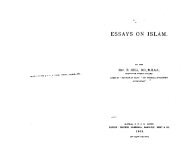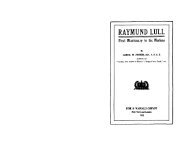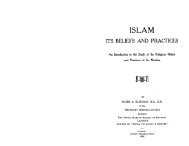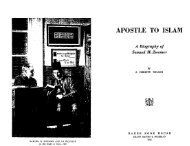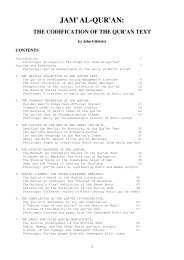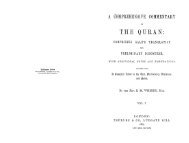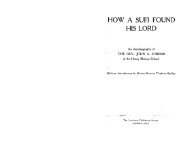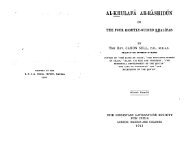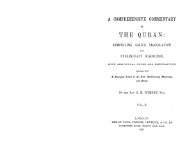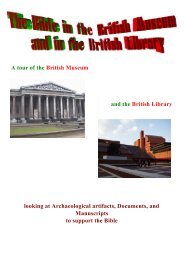- Page 1 and 2:
THE LIFE OF MUHAMMAD "A TRANSLATION
- Page 3 and 4:
CONTENTS ACKNOWLEDGEMENTS INTRODUCT
- Page 5 and 6:
x Contents Names of the Emigrants w
- Page 7 and 8:
xiv The Life of Muhammad informants
- Page 9 and 10:
XV1ll The Life of Muhammad and dark
- Page 11 and 12:
xxii The Life of Muhammad man is in
- Page 13 and 14:
xxvi The Life of Muhammad society w
- Page 15 and 16:
xxx The Life of Muhammad Introducti
- Page 17 and 18:
xxxiv Ibn Is~aq's reputation. The L
- Page 19 and 20:
xxxviii The Life of Muhammad AI-Buk
- Page 21 and 22:
xlii The Life of Muhammad Probably
- Page 23 and 24:
xlvi The Life of Muhammad Introduct
- Page 25 and 26: IN THE NAME OF GOD, THE COMPASSIONA
- Page 27 and 28: 6 The Life of Muhammad Perceiving t
- Page 29 and 30: 10 The Life of Muhammad And (God de
- Page 31 and 32: I The Life of Muhammad 4 . ~ h whic
- Page 33 and 34: 18 The Life of Muhammad It is said
- Page 35 and 36: 31 22 The Life of Muhammad would ma
- Page 37 and 38: 3S 26 The Life of Muhammad to God a
- Page 39 and 40: 4' T.945 3° The Life of Muhammad I
- Page 41 and 42: +7 49 5° The Life of Muhammad THE
- Page 43 and 44: 38 The Life of Muhammad of 'Amra d.
- Page 45 and 46: The Life of Muhammad her head to gr
- Page 47 and 48: 46 The Life of Muhammad Samayda', o
- Page 49 and 50: 50 The Life of Muhammad Murr b. Udd
- Page 51 and 52: 54 The Life of Muhammad We collecte
- Page 53 and 54: The Life of Muhammad The Life of Mu
- Page 55 and 56: The Life of Muhammad THE DIGGING OF
- Page 57 and 58: T. 1076 97 66 The Life of Muhammad
- Page 59 and 60: 70 The Life of Muhammad of al-I:Iaj
- Page 61 and 62: 109 74 The LIfe of Muhammad The Lif
- Page 63 and 64: II4 The Life of Muhammad None but t
- Page 65 and 66: 82 The Life of Muhammad THE SACRILE
- Page 67 and 68: 86 The Life of Muhammad and earth a
- Page 69 and 70: 13° 131 The Life of Nluhammad REPO
- Page 71 and 72: 94 The Life of Muhammad youngest pe
- Page 73 and 74: 9S The Life of Muhammad apostle tol
- Page 75: 148 102 The Life of Muhammad When I
- Page 79 and 80: THE BEGINNING OF THE SENDING DOWN O
- Page 81 and 82: II4 The Life of Muhammad Khuwaylid
- Page 83 and 84: , ,8 The Life of Aluhammad the-cup
- Page 85 and 86: '7' 122 The Life of Muhammad At thi
- Page 87 and 88: 126 The Life of Muhammad Do not mak
- Page 89 and 90: 18z '30 The Life of Muhammad Rise a
- Page 91 and 92: 134 The Life of Muhammad spirit whi
- Page 93 and 94: 138 The Life of Muhammad young men
- Page 95 and 96: If2 The Life of Muhammad conference
- Page 97 and 98: 208 THE FIRST The Life of Muhammad
- Page 99 and 100: 217 u8 ISO The Life of Muhammad Did
- Page 101 and 102: 223 154 The Life of Muhammad the Ab
- Page 103 and 104: 158 The Life of Muhammad between hi
- Page 105 and 106: 162 The Life of Muhammad 234 Then s
- Page 107 and 108: 166 The Life of Muhammad (Ie. recon
- Page 109 and 110: 170 The Life of Muhammad was hard b
- Page 111 and 112: '74 The Life of Muhammad To a chief
- Page 113 and 114: I The Life of Muhammad stranger, a
- Page 115 and 116: 182 The LIfe of Muhammad by night i
- Page 117 and 118: 271 186 The Life of Muhammad The Li
- Page 119 and 120: The Life of Muhammad Hassan b. Thab
- Page 121 and 122: 194 The Life of Muhammad passed by.
- Page 123 and 124: 288 The Life of Muhammad Jews used
- Page 125 and 126: 202 The Life of Muhammad 294 the ap
- Page 127 and 128:
3°2 206 The Life of Muhammad young
- Page 129 and 130:
210 The Life of Muhammad Imru'ul-Qa
- Page 131 and 132:
214· The Life of Muhammad they dis
- Page 133 and 134:
218 The Life of Muhammad THE LODGEM
- Page 135 and 136:
222 The Life of J11uharnrnad 325 Th
- Page 137 and 138:
226 The Life of Muhammad he stumole
- Page 139 and 140:
230 The LIfe of Muhammad are dear t
- Page 141 and 142:
234 The Life of Muhammad BROTHERHOO
- Page 143 and 144:
35° The Life of ,Huhaml/lad l\:ly
- Page 145 and 146:
355 242 The LIfe of Muhammad I went
- Page 147 and 148:
246 The Life of Muhammad Hypocrites
- Page 149 and 150:
250 The Life of l\Iuhammad He came
- Page 151 and 152:
37+ 254 The Life of Muhammad they s
- Page 153 and 154:
The LIfe of i"vluhammad book; bring
- Page 155 and 156:
262 The LIfe of lvluhammad The yout
- Page 157 and 158:
266 The Life of Muhammad Xu'man b.
- Page 159 and 160:
27° The Ufe of M~lIhammad well tha
- Page 161 and 162:
The Lzfe of l\luhammad 274 d 'd f '
- Page 163 and 164:
4 12 278 The Life of Muhammad Khazr
- Page 165 and 166:
282 The LIfe of Muhammad \Vith how
- Page 167 and 168:
286 The Life of 1Vfuhammad some men
- Page 169 and 170:
A person above suspicion told me on
- Page 171 and 172:
294 The Life of Muhammad with you.
- Page 173 and 174:
The Life of Muhammad whether they h
- Page 175 and 176:
302 The Life of Muhammad 447 tar! w
- Page 177 and 178:
455 306 The Life of Muhammad Humayd
- Page 179 and 180:
310 The Life of Muhammad people. Ab
- Page 181 and 182:
314 The Life of Muhammad with proph
- Page 183 and 184:
318 The Life oj Muhammad JumaQ. He
- Page 185 and 186:
322 The LIfe of Muhammad Then God s
- Page 187 and 188:
326 The Life of Muhammad Then God m
- Page 189 and 190:
330 The Life of Muhammad had gone f
- Page 191 and 192:
5°1 5°2 334 The Lzfe of Muhammad
- Page 193 and 194:
338 The Life of Muhammad struck off
- Page 195 and 196:
3+ 2 The Life of Muhammad The Life
- Page 197 and 198:
523 346 The Life of Muhammad By nig
- Page 199 and 200:
35 0 The Life of Muhammad The Life
- Page 201 and 202:
53' 354 The Life of Muhammad That t
- Page 203 and 204:
537 The Life of Muhammad Hind d. 'u
- Page 205 and 206:
The Life of JVluhmnmad 3 62 [Abu Su
- Page 207 and 208:
366 The Life of Muhammad In the val
- Page 209 and 210:
37 0 The Life of Muhammad The Life
- Page 211 and 212:
374 The Life of Muhammad Jafar b. '
- Page 213 and 214:
The Life of Muhammad The apostle sa
- Page 215 and 216:
The Life of Muhammad answered, 'He
- Page 217 and 218:
582 Hind d. 'Utba also said: The Li
- Page 219 and 220:
T· 1429 390 The Life of Muhammad e
- Page 221 and 222:
394 The Llfe of Muhammad and mine i
- Page 223 and 224:
398 The Life of Muhammad overlook t
- Page 225 and 226:
402 The Life of Muhammad Za'ura' b.
- Page 227 and 228:
406 The Life of Muhammad Every coat
- Page 229 and 230:
410 The Life of Muhammad The light-
- Page 231 and 232:
4 r 4 The Life of Muhammad I said,
- Page 233 and 234:
The Life of Muhammad I complain to
- Page 235 and 236:
4 22 The Life of Muhammad When hear
- Page 237 and 238:
+26 The Life of Muhammad Men of Qur
- Page 239 and 240:
43 0 lOr, perhaps, 'thieves'. The L
- Page 241 and 242:
434 The Life of Muhammad me is most
- Page 243 and 244:
4-38 The Life of Muhammad Abu'I-J:I
- Page 245 and 246:
The Life of Muhammad And the disbel
- Page 247 and 248:
446 The Life of Muhammad Ji\Iiish,
- Page 249 and 250:
45 0 The Life of Muhammad The Life
- Page 251 and 252:
454 The Life of Muhammad The Life o
- Page 253 and 254:
458 The Life of Muhammad Called all
- Page 255 and 256:
The Life of Muhammad been sent and
- Page 257 and 258:
466 The Life of Muhammad Shu'ba b.
- Page 259 and 260:
7°1 The Life of Muhammad POETRY AB
- Page 261 and 262:
474 The Life of Muhammad All with a
- Page 263 and 264:
The Life of Muhammad The Life of Mu
- Page 265 and 266:
4 82 The Life of Muhammad AI-Buwayr
- Page 267 and 268:
7 1 9 7 20 4 S6 The Life of Muhamma
- Page 269 and 270:
49 0 TilE RAID ON B. AL-MUSTALIQ Th
- Page 271 and 272:
494 The Life of Muhammad The L1/e o
- Page 273 and 274:
498 The Life of Muhammad Then Safwa
- Page 275 and 276:
502 The Life of Muhammad Then they
- Page 277 and 278:
506 The Life of Muhammad The Life o
- Page 279 and 280:
5ro The LIfe of Muhammad take from
- Page 281 and 282:
5 1 4 The Life of Muhammad The LIfe
- Page 283 and 284:
518 The Life of Muhammad The Jews i
- Page 285 and 286:
522 The Life of Muhammad The number
- Page 287 and 288:
526 The Life of Muhammad Ra\1man, '
- Page 289 and 290:
788 530 The Life of Muhammad From B
- Page 291 and 292:
534 The Life of Muhammad 794 'Why w
- Page 293 and 294:
The Lzfe of Muhammad In Islam they
- Page 295 and 296:
80 5 806 The Life of Muhammad 543 5
- Page 297 and 298:
8IZ 54 6 The Life of Muhammad When
- Page 299 and 300:
55 0 The Life of Muhammad The Life
- Page 301 and 302:
554 The Life of Muhammad The Life o
- Page 303 and 304:
558 The Life of Muhammad The Life o
- Page 305 and 306:
562 The Life of Muhammad a dog's bo
- Page 307 and 308:
566 The Life of Muhammad Ibn Shihab
- Page 309 and 310:
57° The Life of Muhammad The Life
- Page 311 and 312:
574 The Life of Muhammad Were like
- Page 313 and 314:
578 The Life of Muhammad I tell you
- Page 315 and 316:
582 He also said: The Life of Muham
- Page 317 and 318:
586 The Life of Muhammad A woman of
- Page 319 and 320:
590 The LIfe of Muhammad The Life o
- Page 321 and 322:
594 The Life of Muhammad I have nev
- Page 323 and 324:
The Life of Muhammad If you don't a
- Page 325 and 326:
602 The Life of Muhammad Who devote
- Page 327 and 328:
9°1 9°2 606 The Life of Muhammad
- Page 329 and 330:
610 The Life of Muhammad brother of
- Page 331 and 332:
61 4 The Life of Muhammad The Life
- Page 333 and 334:
618 The Life of Muhammad the disaff
- Page 335 and 336:
927 622 The Life of Muhammad The Li
- Page 337 and 338:
626 The Life of Muhammad Nor are th
- Page 339 and 340:
937 The Life of Muhammad We protect
- Page 341 and 342:
634 The Lzfe of Muhammad Or the two
- Page 343 and 344:
The Life of Muhammad into this coun
- Page 345 and 346:
The Life of Muhammad THE COMING OF
- Page 347 and 348:
646 The Life of Muhammad And if the
- Page 349 and 350:
968 The Life of Muhammad were throw
- Page 351 and 352:
654 The Life of Muhammad Mas'iid fr
- Page 353 and 354:
The Life of Muhammad worlds. I have
- Page 355 and 356:
977 662 The Life of Muhammad of B.
- Page 357 and 358:
982 666 The Life of Muhammad The Li
- Page 359 and 360:
The Life of Muhammad act circumspec
- Page 361 and 362:
T· 1441 The LiP of Muhammad I put
- Page 363 and 364:
The Life of Muhammad wouid recover,
- Page 365 and 366:
1011 1012 682 The Life of Muhammad
- Page 367 and 368:
1016 1017 686 The Life of Muhammad
- Page 369 and 370:
690 The Life of Muhammad He was the
- Page 371 and 372:
The Life of Muhammad Umavva b. Abu
- Page 373 and 374:
The Life of Muhammad As Koah's son
- Page 375 and 376:
702 The Life of Muhammad 67. KhauHi
- Page 377 and 378:
7 06 The Life of Muhammad al-Haf b.
- Page 379 and 380:
7 10 The Life of Muhammad Ibn Hish{
- Page 381 and 382:
7 1 4 You can say of the eye when i
- Page 383 and 384:
718 The Life of Muhammad Al-l;Iaril
- Page 385 and 386:
7 22 203. Jid means 'neck', as in t
- Page 387 and 388:
The LIfe of Muhammad say when he de
- Page 389 and 390:
73 0 The Life of Muhammad Ibn Hishi
- Page 391 and 392:
734 The Life of Muhammad Ibn Hishii
- Page 393 and 394:
The Life of Muhammad 73 8 . d verse
- Page 395 and 396:
742 The Life of Muhammad Ibn Hishii
- Page 397 and 398:
746 The Life of Muhammad 486. J:lar
- Page 399 and 400:
75° The Life of Muhammad 544· Abu
- Page 401 and 402:
754 The Life of Muhammad dead are i
- Page 403 and 404:
The Life of Muhammad on which you s
- Page 405 and 406:
The Life of Muhammad I;fujayr b. Ab
- Page 407 and 408:
The Life of Muhammad Another meanin
- Page 409 and 410:
The Life of Muhammad 77° . I'Th 'd
- Page 411 and 412:
774- The Life of Muhammad Ibn llish
- Page 413 and 414:
The Life of Muhammad pass and when
- Page 415 and 416:
The Life of Muhammad and addressed
- Page 417 and 418:
The LIfe of Muhammad Vle smote men
- Page 419 and 420:
79 0 9 1 5. I have heard that when
- Page 421 and 422:
794 The LIfe of Muhammad Ibn Hisham
- Page 423 and 424:
The Life of Muhammad God and those
- Page 425 and 426:
802 Index of Proper Names 'Abdul-l\
- Page 427 and 428:
806 Miilik b. Anas, xiii, xvi, xxiv
- Page 429 and 430:
Aban b. $iilib, 531, 553. Ajlai:l,
- Page 431:
INDEX OF BOOKS CITED Aghani, aI, xx



